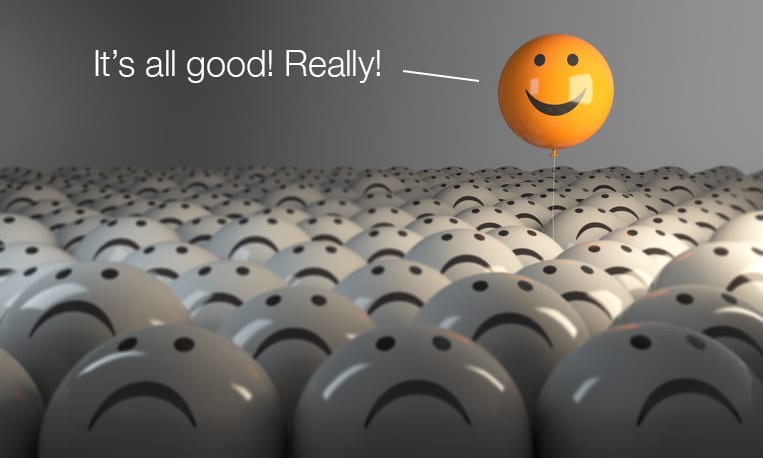Sugarcoating the Apple agency layoffs
I am eternally grateful that no one ever asked me to write a PR release for a company in trouble.
It’s a thankless job, and nobody believes what you write—but write you must.
That’s why so many surrender from the start, dipping into a reservoir of classics like, “He’s leaving to pursue other opportunities.”
This was the challenge served up to the spokeswoman at Apple’s agency, Media Arts Lab, to explain the recent layoffs of 50 people.
Thankfully, she didn’t ask us to believe that those 50 simultaneously decided to pursue other opportunities. What she did ask us to believe was something equally absurd.
“Our relationship with Apple has never been stronger.”
Mm-hmm.
Let’s start with the obvious. Layoffs don’t just happen. They only happen when money starts to flow out faster than it flows in. And it’s clear as a bell what’s happened to MAL’s bottom line.
Apple has now been building its in-house agency for several years. It’s hired two ad industry giants to lead its effort and hundreds to fill its ranks.
Put simply, Apple is doing more and MAL is doing less. Thus, the layoffs.
If you believe in the Steve Jobs school of management, this whole arrangement is actually a bit hard to swallow.
Steve drew a distinct line between the responsibilities of the agency and the in-house group. The agency developed the big campaign ideas and Apple’s team would leverage those ideas on apple.com and across many geographies.
Steve believed that each side should focus on what it does best. But his passing changed all of that.
The tension between the agency and Apple became public during the Samsung trial in emails between Phil Schiller and Tim Cook. Phil expressed frustration with the agency and the two discussed firing it.
The agency survived, but the relationship was changed forever. It now reported to people who had a history of grievances, and it no longer enjoyed the trust and support granted by Apple’s founder.
With Steve, the agency had a soulmate. With the “new Apple,” the agency had only a client. Huge difference.
It hurts to see a legendary relationship winding down, just as it did when John Sculley fired the same agency years ago, ignoring its talent and history of great work.
The fact is, Apple simply doesn’t need MAL like it used to—and this isn’t by accident. It’s by design.
I leave it to you to decide whether it’s a good idea for Apple to transition to an in-house agency. There are arguments on both sides. But it’s clear that the transition is happening—and it’s not hard to see where this ends.
Reading MAL’s positive spin on 50 layoffs, I’m reminded of the young Kevin Bacon’s classic line in Animal House: “Thank you sir, may I have another!” That’s what he’d say through gritted teeth with each painful strike as he’s being paddled in his underwear.
In putting a spin on the layoffs by saying the relationship with Apple is stronger than ever, MAL might just as well have said, “Thank you Apple, may we have another!”


Ken,
Really appreciate your posts.
The first thing I thought of is this clear statement from Tim:
We believe that we need to own and control the primary technologies behind the products that we make, and participate only in markets where we can make a significant contribution.
Marketing isn’t “technologies” but what you described is clearly in line with the Cook doctrine.
Kind regards,
Not a bad theory, but it does have one little flaw. Tim’s “clear statement” was actually just Tim echoing Steve Jobs. This was the reasoning Steve gave when he cut off support for Flash—Apple cannot depend on other companies when it comes to providing the best customer experience.
That was one of his uncompromising beliefs. He was willing to take the criticism over the Flash episode, and that criticism was intense. Simultaneously, he believed in partnering with an outside agency in the pursuit of brilliant advertising. So Steve absolutely believes in the philosophy Tim stated, but he didn’t extend that philosophy into the marketing realm.
The implication — and excuse me if I’m putting words in your mouth — is that in this case technology is a different kind of dependency than marketing.
Not being in marketing I nonetheless have to agree: technology here is just building out Apple’s fundamental magic: the vertical integration.
With marketing/media/branding, Apple had someone other than Apple (and I think that’s key) looking at Apple and giving an opinion on Apple. Like therapy. :). Or like a doctor having himself as a patient…
It could be that I just don’t get as exposed to advertising as I used to be since I stream everything but the Apple ads post Jobs have little whimsy, delight or magic like they used to. They are more corporate, cold and bland and don’t feel very Apple to me. Ken what do you think?
Under a competent CEO then…. MAYBE this would be a good move.
Cook is utterly incompetent.
SIDE NOTE: I can’t believe for even a nano second that what was revealed in the samsung trial was a new position for Schiller (who is a pompous wind bag), which means he was likely taking the same position while Steve was alive (creating an interesting bit of tension i’m sure).
sorry.. I’m very negative on apple these days. Everything they stood for is gone and they have on so many occasions destroyed every bit of trust I had in them.
they’re just another monolith now
Layoffs in advertising happen all of the time, I wouldn’t read too much into the Media Arts Lab/Apple relations being the reason for these layoffs unless Apple is the ONLY client of Media Arts Lab (which I highly doubt).
I realise I’m a bit late to the party on this, but Media Arts Lab exists purely to work on Apple. It is in fact the ONLY client that MAL has, and this is by design. Technically it’s an arm of TBWA\ but given that it sits in different buildings in most regions and almost all of the staff work entirely separately from TBWA\, it may as well be a separate arm of Omnicom.
Check out the Media Art Lab website to see a site that is aggressively NOT looking for business or fame. It’s just a list of phone numbers and a link to email CVs to. No work, no staff, no explanation.
MAL takes a perverse pride in being the ‘shadow agency’ that exists to work on a single client, never takes the limelight and is even more secretive than even Apple. But this round of layoffs does offer a bit of a peek behind the curtain.
What was the last ad you remember from Apple? I’m a Mac, Think Different, the Super Bowl ad were all developed outside Apple. Ever since Apple’s Marcom group was taken over by Tor Myhren from Madison Avenue all they’ve offered are bland, blander and blandest. Marcom has also become an extremely bloated organization which now serves to auto-destructs any kind of creativity. Very sad.
Your so so right. I’m watching the transformation in tears and can’t believe its really happening.
Handling all the creative process internally is the fantasy of all management people and I guess very little amount of people can see the difference between in-house creative team and agency.
Both the way of managing and products are not going very well so far, I really hope a magic stick comes soon, before another AirPod is released with a plastic earbud 🙁